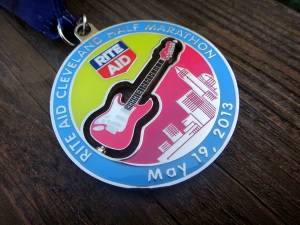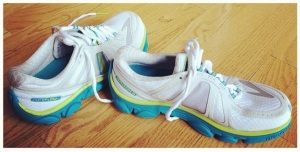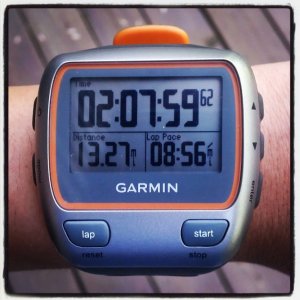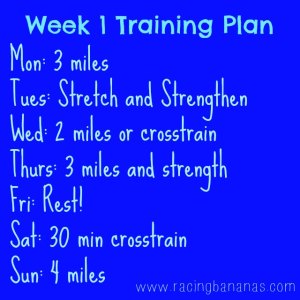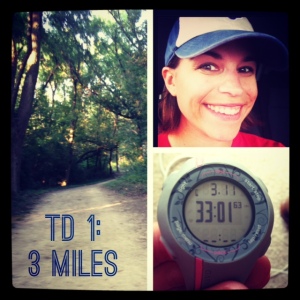Happy Tuesday all! For today’s post, I’ve asked the wonderful Beth from Mangoes and Miles to chat with you about training for your first half marathon. I know a lot of you are training for your first half, like me, and I love hearing Beth’s perspective – especially since she ran her first half this spring! After reading her tips, I highly recommend heading over to her blog and checking out some of her other posts – she is one of my favorite bloggers for a reason!
7 Tips for First Time Half Marathon Runners
Hey guys! I’m Beth from Mangoes and Miles, my little corner of the internet where I geek out about running and the copious amounts of froyo that I eat.
I never really liked running that much. I’ve only been running consistently since February, when I decided that I wanted to run a half marathon. (Because that’s what everyone who dislikes running does, right?) 2.5 weeks before my race, I ended up burnt out and injured and almost considered not running—until I did, got addicted, and immediately started scouting out opportunities for my next race.
I’m in the midst of training for the Long Beach Half Marathon in October. After that, I plan on building on my half marathon training to run the Chevron Houston MARATHON in January! (Crazy talk. I still don’t really know how that happened.)
I’m honored to be here today and share a teensy bit of my (non-expansive) wisdom with you so you don’t end up like me. Being burnt out and injured is not fun…especially 2.5 weeks before your race.
Disclaimer: I’m not an expert on running. (Although I wish I was.) What I say may or may not be applicable to you and I’m definitely not the end-all-be-all. I’m just here to share my personal experiences.
Before you do anything else:
1. GET FITTED FOR SHOES.
I started training in the shoes I used for cross-training. They weren’t made for long-distance running. My feet hurt after every run, and I eventually developed plantar faciitis and hip problems. Any specialty running store will analyze your gait and get you fitted for free. Dropping $100 on a new pair of shoes now is nothing compared to the pain and physical therapy charges you’ll rack up later.
2. You may have to train to train.
If you don’t have any sort of running base, you need to develop that before you dive into a plan. Most plans’ mileage in the first week is in the teens, and if you’re like me and only ran 2.5 miles every other week, it’s hard to keep up that mileage week after week.
3. Don’t focus on speed.
Running 13.1 miles is hard enough. I didn’t do any speed work to prepare for my first half, and this time around I only have 1 day (out of 5) devoted to speed work. For newer runners, the key thing is consistency: the more you run, the faster you’ll get. Unless you’re an experienced runner, focus on just finishing the 13.1 miles.
4. Go easy when you need to, go hard when you need to.
If there is one thing I could tell every first-time long distance runner, it’s this. Training for my first half, I would go out every day and try to make that run faster than the day before.
Your body just can’t physically sustain that high mileage at that fast of a pace. It needs time to recover, and if you’re going max effort 5 times a week, it doesn’t have that time. Most of your runs should be at an easy, conversational pace. Even the pros run easy most of the time—out of Kara Goucher’s 14 training runs per week, 9 are easy.
 (Source)
(Source)
On a different, but still related, note, don’t run your long runs too fast. Your long runs should ideally be anywhere between 60-90 seconds slower than your intended race pace. The point of your long runs isn’t to see how fast you can go far, rather, it’s to get your body used to being upright and moving for so long.
5. Use your long runs to get comfortable with your race day routine.
Find a breakfast that works for you, and stick with it on race day. If you’re traveling for your race, make sure you can access your chosen breakfast. Figure out when you want to take fuel. (Please take fuel for your longer long runs, at the very least. I once did an 11-miler without any fuel…never again.)
6. Listen to your body.
If something hurts, take a day off. If you’re thirsty on a long run, get some water. If you’re huffing and puffing during an easy run, slow down. Your body knows exactly what it needs—you just need to listen to it.
7. Mentally prepare to go a little more than 13.1 miles.
New racers are always surprised that their Garmin says they ran more than 13.1 miles. The course is most likely measured through the “shortest possible distance” method, which means that you would need to take all the tangents perfectly to run exactly 13.1 miles. You don’t need to run extra in training to compensate for this, but just be aware that when your Garmin strikes 13.1 on race day, you’ve still got a little left to go. You can read a little more about how courses are measured and maybe pick up a few tips on how to run the shortest route here.
Your Turn!
- What are your thoughts? Any other tips and tricks you would add?
- Favorite froyo flavor?!


